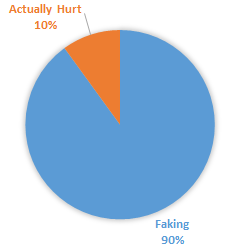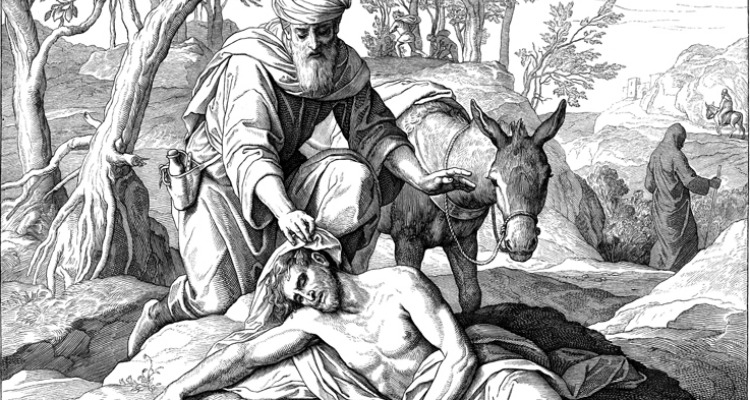Ok, so I’m walking down the sidewalk and see a man beaten and lying down. He looks foreign. Not Canadian-foreign, maybe with a nice overcoat and glasses, but foreign-foreign, with dark skin, dirty clothes (obviously dirty before he got hurt), and I definitely don’t recognize the brand of shoes he’s wearing. First thing in my mind: this man is dangerous. Obviously. Second thing in my mind: get the hell out of there. Probably a good idea, but let’s consider this rationally. As a concerned member of society, I don’t want bigotry and bias getting in my way.
First, let’s inspect the possibilities of whether or not the guy is actually hurt. Given the amount of beggars I see on the road, and given the amount of poor people being let into the country illegally or legally these days, the chances seem pretty high that he’s not actually hurt, or at least not as bad as it looks. So the pie chart of decision looks something like this:

Yeah, that’s what I thought. But for his sake, let’s assume he’s actually hurt. Let’s assume the blood on his chin is real, and his mumblings–in whatever language they are–are calls for help. Let’s give him the benefit of the doubt. This leads us to our next decision point.
Will he hurt me?
This is a hard one to answer. Lots of people hurt other people. And chances are even higher for people who are already hurt! Statistics show that people involved in crime have a higher likelihood of committing crime themselves. On the off-chance that he is actually hurt, what did he do to get so badly injured? Who did he piss off? Ok, let’s pie chart this as well, taking into account things like foreign dangers, illegal immigrants, and criminals in general.

Also what I thought. I’m getting really nervous now, but I’m gonna continue to give this guy the benefit of the doubt. Its my Christian responsibility. Let’s assume he’s among the 5% who will be peaceful (this is of course assuming he’s among the 10% who is not faking). I have one final decision to make. If I help him–say, call the paramedics or take him somewhere myself (let’s be honest, I’m not touching this guy)–what are the chances he holds some anti-American or violent ideas? Will be perpetuate those ideas? Does he hate me for looking at him? Will his ideas harm my children, or my children’s children? I’ll forgive the fact that he’s probably Muslim, because I know not all Muslims are bad people. But what are the chances his ideas will wreak violence in the future?

Not gonna lie, this one really surprised me! If this guy is really hurt, and if he won’t hurt me immediately, there’s a 90% chance that his ideas won’t harm me or my progeny in the future. But…that 10%. I have to think about that. How can I look my grandchildren in the eyes one day and tell them that I let a potential terrorist run free? How can I face my wife at home as she pulls the perfectly-cooked roast from the oven and gets the children to the table in anticipation of my arrival? How can I tell them that I brought risk upon our way of life?
Honestly, I can’t. And Jesus, well, Jesus would not want me to endanger my family. He said “let the children come to me,” not “endanger these children by sending terrorists after them”! I know, God, the whole good samaritan story…well, there are stipulations. There are needs to a civil society, and I’m not about to risk my livelihood and those around me because of the lessons of one fable told a few thousand years ago. Jesus said a lot of things, and I am absolutely still a good Christian even if I don’t help this man.
Look, I’ll call the cops, that’s what I’ll do. They’ll probably arrest him for getting in the way, but people get health care–free health care at that–in prison, so his wounds will get taken care of. Then if he’s guilty, they’ll have him locked up, and if he’s innocent, someone will come and help him out. I’m sure of it. People in prison get plenty of help these days, and there’s translators available in case he doesn’t speak our language. Great idea. Cops will clean all this up. Whew.
Oh, and I’ll make sure my family remembers him in prayers tonight. It’s the least I can do.

You must be logged in to post a comment.